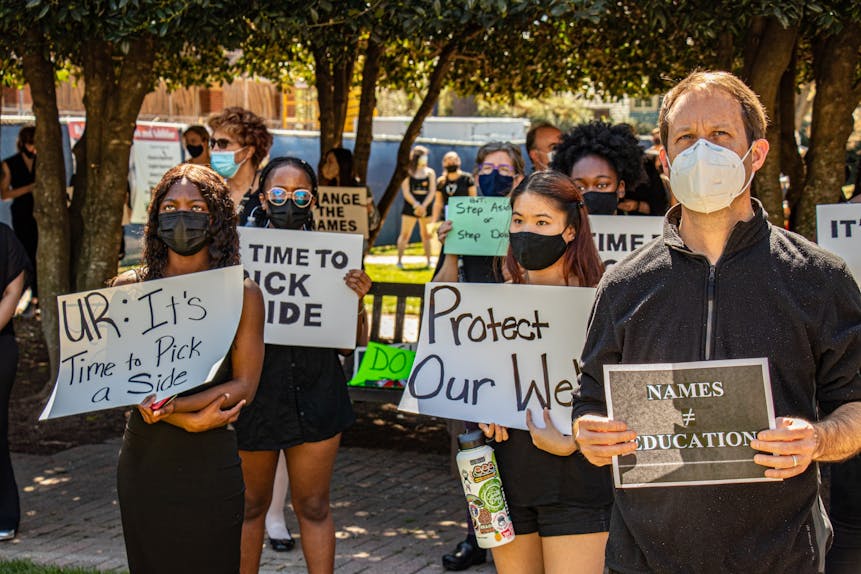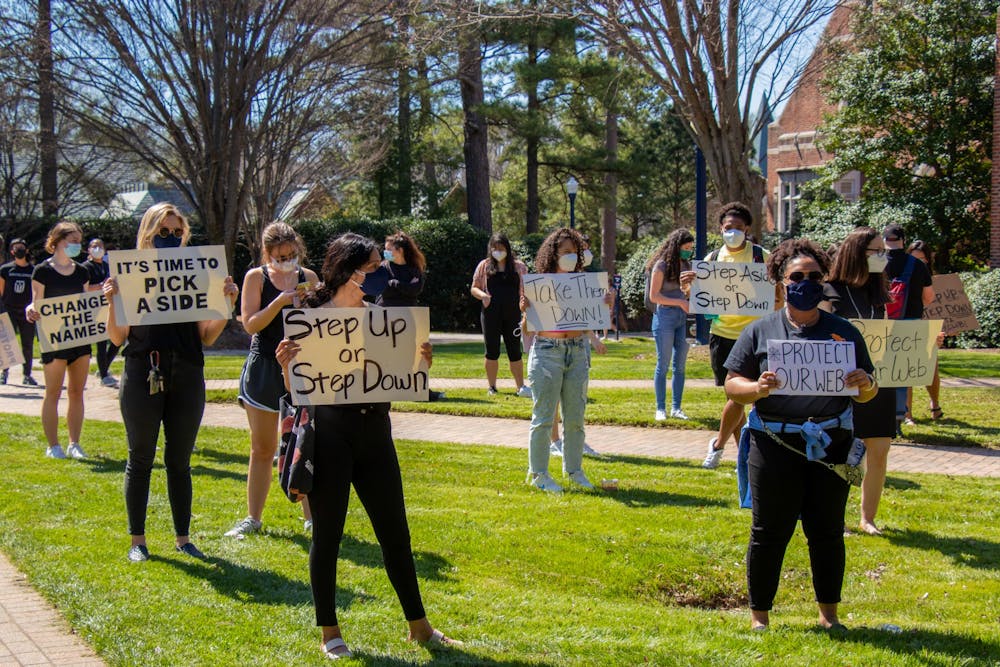Editor's Note: This is a developing story.
Students, faculty and staff gathered on March 26 at the University of Richmond's Stern Plaza to silently protest the Board of Trustees’ decision to not rename Mitchell-Freeman and Ryland halls.
Supporters of the UR Black Student Coalition’s Statement on Black Student Welfare, which called for UR to remove Douglas Southall Freeman and Robert Ryland from the buildings named after them because of their ties to segregation and slavery, wore black and held signs with messages including “It’s time to pick a side,” “Protect our web,” “Change the names,” “Step aside or step down” and “Black Lives Matter.”
The silent protest was scheduled at the same time as a board and faculty meeting held at the tent in front of the Jepson School of Leadership Studies, which was roped off. Although the protesters started filling Stern Plaza at 2 p.m. under 84-degree heat, members of the board did not show up until 3:15 p.m. The meeting lasted until 4:23 p.m., at which point members of the board exited through Jepson Hall without directly addressing the crowd.
The protest comes a day after members of at least 88 campus organizations disaffiliated from UR in support of the request made by the Black Student Coalition that students, faculty and staff cease involvement on March 25 from task forces, student organizations and fundraising.
The deadlines for disaffiliation were moved from April 1 for seniors and April 15 for other undergraduates to Thursday for all students, faculty and staff following a March 17 email sent by President Ronald Crutcher to the UR community. The email included a statement from the board stating that the names of Mitchell-Freeman and Ryland halls would not be changed because it would go against the educational mission of UR.
Sophomore Jalen Jones attended the protest to show the board that its decision to not rename Mitchell-Freeman and Ryland halls was wrong, he said.
“The vast amount of the student body that was here just shows that we are a united front,” Jones said. “We're standing up to the board and saying that we won't take this anymore. So, I feel very proud today at the effort that we showed them.”
As of March 26, the Google form that supporters of the Statement on Black Student Welfare can sign has reached 1,167 signatures.

Protesters stand stand silently, holding signs reading "NAMES ≠ EDUCATION," "Protect Our Web," and "UR: It's Time to Pick a Side."
Enjoy what you're reading?
Signup for our newsletter
Signatories Adrienne Piazza and Jessica Washington — associate director and assistant director of student engagement and the Bonner Scholars program — attended the protest to support the voices of Black students, they said.
“As an office, we support modes of civic engagement in different ways, and a demonstration like today is one form of that,” Piazza said. “While there are many ways that people can show up and support the movement, this felt like a moment to be in community with people.”
A Richmond native, Washington has dealt with the name-changing question before as she attended the formerly named Harry F. Byrd Middle School, which was named after a senator who supported the massive resistance movement, Washington said. The name of the middle school was changed to Quioccasin Middle School in April 2016, according to a Richmond Times-Dispatch article.
“In my lived experiences as a Black woman, the names of Ryland and Freeman are psychologically harmful,” Washington said. “It's not something that we should put our Black students through and other students who are in solidarity and feel impacted by this decision.”
After the meeting between the board and faculty ended, members of the Black Student Coalition, Richmond College Student Government Association and Westhampton College Government Association met with Crutcher; R. Lewis Boggs, a trustee; Jeff Brown, a trustee; Jeffrey Legro, executive vice president and provost; Paul Queally, rector of the board and Susan Quisenberry, vice rector, according to a statement from the Black Student Coalition Coordinating Committee released on March 27.
Kayla Corbin, a senior and member of the Black Student Coalition, said that in a disappointing but expected move, the board would not revisit the decision to rename Mitchell-Freeman and Ryland halls.
“The Board of Trustees has doubled down, saying that they will not revisit changing the names, and the atmosphere of the meeting was absolutely appalling,” Corbin said. “Specifically, Paul Queally had the most disrespectful and dismissive demeanor that I've ever experienced.”
Cynthia Price, associate vice president of media and public relations, responded to The Collegian’s request for comment from the board and administration about the meeting with students with a statement from UR.
“We thank our students and faculty, and staff leaders for the dialog Friday and for their thoughtfulness in continuing this conversation about race, justice, fairness, and inclusion, challenges that the University has been committed to confronting, especially under the leadership of President Crutcher,” Price wrote. “The University of Richmond’s Board, its leadership, faculty, staff, and students will continue to advance this dialog and our various initiatives toward a common goal of ensuring that all Spiders feel valued and know that they belong at UR.”
Jordyn Lofton, a junior and co-writer of the Statement on Black Student Welfare, characterized Queally’s tone as unapologetic and oblivious to the students’ perspectives, she said.
Corbin and AJ Polcari, former president of the RCSGA, who attended the meeting, said Queally had dominated the conversation, although other Board of Trustees members were present.
“It was an arrogant performance by Paul Queally,” Polcari said.
When sophomore Simone Reid brought up other building names on campus that have been called out by students in the past weeks for their relations to white supremacy, such as Boatwright Memorial Library, Jeter Hall, the Modlin Center for the Arts, Moore Hall and Thomas Hall, Queally questioned whether the students would want his name removed as well, Corbin, Polcari and Reid said.
“It seems that he was concerned about a slippery slope about all of the building names, and ‘what about his name?’” Corbin said.
Between March 18 and March 19, blue paint was placed over the word “Queally” in the sign in front of the Queally Center for Admissions and Career Services, according to an Instagram post by The Collegian. A Black Lives Matter sign was placed over the same sign on March 25, according to an Instagram post by The Collegian.
Brown, who did not speak until he was prompted by Queally, listed the Multicultural Space and the Africana Studies program as things the board had given students, Corbin said.
“They tried to once again co-opt those things and use it as proof that they listened,” Corbin said. “When in actuality, that's just them once again co-opting our labor, which is why we’re disaffiliating in the first place.”
Boggs, Brown and Quisenberry seemed attentive to the students’ concerns, Polcari said.
“[Quisenberry] was trying to strike a very positive tone, but she was listening,” Polcari said. “I thought that she was attentive, and I thought that she really was understanding where students were coming from.”
During the meeting, Polcari warned the board about the financial repercussions not changing the names of Mitchell-Freeman and Ryland halls could have on Giving Day and the senior class gift, he said. At the end of the meeting, Queally pulled Polcari aside to ask him to reconsider his decision to not donate money to UR, Polcari said.
“I thought it was very telling,” Polcari said, regarding his private conversation with Queally. “He doesn't have the guts to really have a conversation with the Black students.”
Reid feels that the decision to not rename Mitchell-Freeman and Ryland halls is not based on the educational mission of UR, she said.
“I definitely think it's even more clear now that this is more of a Paul Queally pride thing than it is about Crutcher and the students or their educational mission,” she said.
The UR Inclusive History Project, commissioned by Crutcher to research the backgrounds of Freeman and Ryland, feels more significant to Polcari, who co-wrote a 2019 joint student government resolution calling for UR to remove the names of Freeman and Ryland from the buildings named after them, he said.
“Without Ronald Crutcher, we would have never had any conversation about this at all. … I can't say anything better about Ronald Crutcher after what I saw today,” Polcari said. “God bless him, he's more compassionate than I am, because I would have never wanted to work with a guy like [Queally].”
In Price's statement, The Collegian's request for comment regarding Brown and Queally’s specific remarks to students in the meeting was not addressed.
The Black Student Coalition is now calling for Queally to step down from the board and for community members to cease donations to UR, Corbin and Reid said.
“We don't believe that he is qualified or prepared to hold a position as rector of the board, especially because a lot of his conversation was saying that he doesn't understand,” Corbin said. “And if he can't understand simple concepts like [how the names of Mitchell-Freeman and Ryland halls uphold white supremacy], I don't think that he's qualified to run something as complex as a university.”
The board’s refusal to cooperate is a bigger motivator for the Black Student Coalition, Reid said.
“Now we can go even harder,” she said. “We can put our best foot forward and try to get all the moving heads, and then we can try to get people to pull money out of the university.”
The coordinating committee of the Black Student Coalition is grateful for the show of support at the silent protest and will continue demanding the name-change of Mitchell-Freeman and Ryland halls, according to the Black Student Coalition’s statement.
“We thank faculty, staff, students, alumni and others in our community for their help thus far. This is only the beginning of our fight,” the coordinating committee wrote.
Contact investigative and multimedia editor Jackie Llanos at jackie.llanoshernandez@richmond.edu.
Support independent student media
You can make a tax-deductible donation by clicking the button below, which takes you to our secure PayPal account. The page is set up to receive contributions in whatever amount you designate. We look forward to using the money we raise to further our mission of providing honest and accurate information to students, faculty, staff, alumni and others in the general public.
Donate Now



